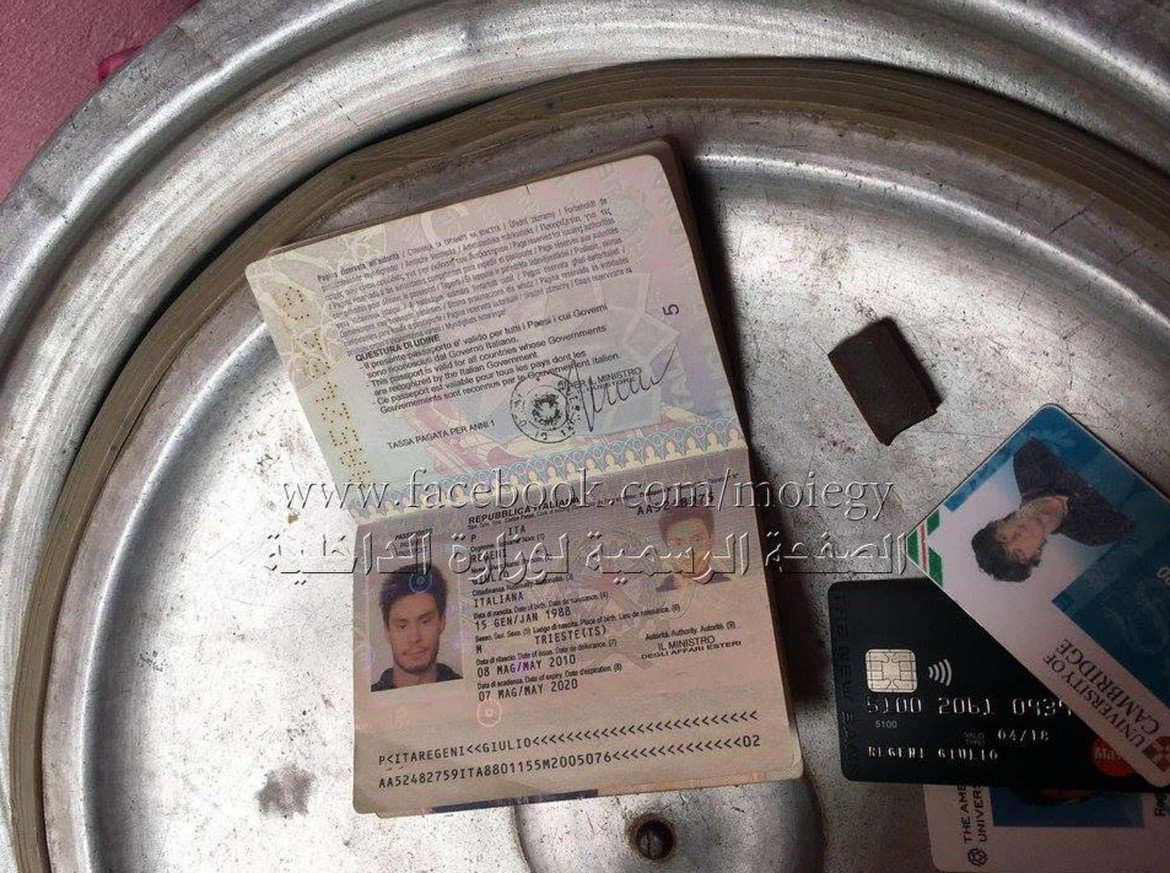The Egyptian Interior Ministry published three photos on its Facebook page Thursday night along with a new version of events in the death of Italian doctoral student Giulio Regeni. On a silver tray, his passport is laid open to the first page, next to student IDs and a credit card. In another image, a cell phone is shown being held, inexplicably, by a child.
These objects, the ministry claims, were discovered in a duffle bag belonging to a criminal gang “specializing in impersonating policemen, kidnapping foreigners and stealing their money.”
What evidence connects this gang to Regeni? His personal belongings, they allege, were found in the house of the sister of one of the gang members. The fake police uniforms would explain why witnesses reported seeing Regeni, on the evening of Jan. 25, the fifth anniversary of the Tahrir Square revolution, being taken away by police officers.
The four alleged criminals will not have a say in this. They were all killed by Egyptian police inside a minibus in Cairo. Local media published photos of the bullet-riddled vehicle and the bodies of the alleged perpetrators, identified as Tarek Abdel Fattah, 52, his son Saad Abdel, 26, Mostafa Bakr, 60, and Salah Ali, 40. The lifeless body of a fifth man was in the rear of the minibus, together with two guns and police badges.
Tarek Abdel Fattah’s sister, Rasha, gave a statement to the Egyptian investigators that “Giulio Regeni was killed because he resisted the robbery.” A statement that does not in any way explain the obvious signs of prolonged torture on Regeni’s body.
Raising further doubts about the veracity of the Interior Ministry’s version, the British newspaper The Guardian asked ministry spokesman General Hathem Fathy why a child’s hands appear in one of the photos. Fathy’s answer: No child was present.

If Cairo hopes to foist this “truth” on Italy and the world, it will have to do better. All the obvious questions remain unanswered: Why would a gang of criminals kidnap a foreign citizen on the night of the anniversary of the revolution, a time when soldiers were deployed to every corner of the capital? Why would they have used such atrocious torture methods before killing him? Why did they hold him hostage for nine days only to kill him later? And why not get rid of his belongings, a clear sign of guilt?
The ministry has not formally assigned responsibility for Regeni’s death to the massacred men in the minibus. They’ve only tossed out another piece of the puzzle: some documents, police uniforms, the scourge of crime. The Egyptian intelligence services must have felt the weight of the suspicion toward them. So much for the transparent investigation President Abdel Fattah el-Sisi promised.
On Wednesday, el-Sisi ordered 10 cabinet ministers out of their jobs, but not the interior minister. Magdi Abdel Ghaffar fared in style. He won’t be held accountable for his legal responsibility for the gaps in the investigation or his political responsibility for the institutionalized violence of the police and secret services.
Leaving Ghaffar in office sends a crystal-clear message to the Egyptian people: El-Sisi approves of the police, the censorship, the violence. Those who pay the price are the opposition, activists, NGOs and independent media, silenced by a police state and the impunity that the West guarantees the Egyptian dictatorship. Cairo is a faithful friend, a position built thanks to the threat of Islamic terrorism. Egypt has the central role in the Libyan conflict, with economic and military alliance with another Western pillar, Saudi Arabia.
And while Italian investigators in Cairo this week reiterated that “the case is not closed” and that nothing connects the alleged gang with Regeni’s death, Italy at the same time is strengthening economic relations with Egypt. Pasqualino Monti, commissioner of the Civitavecchia Port Authority, met with the minister for economic affairs in Cairo to begin cooperation on fruit and vegetable trade.

